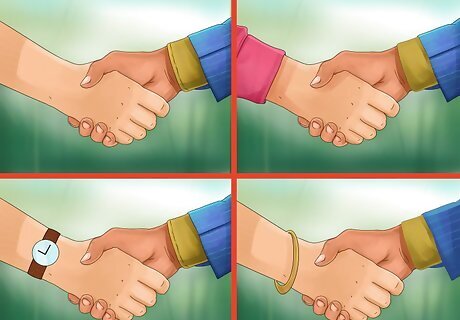
views
Meeting People

Go out. The first step in meeting people is to go out and explore your new town. If you can't think of anything to do, start by going out to a restaurant and eating. Take a book with you so you have something to do. It may seem counter-intuitive to take a book with you, but it could act as a conversation starter. Find a restaurant that has a bar you can sit at. Bars are great for eating by yourself, but they also put you with others who may also be eating alone. It may be easier to strike up a conversation if you are eating around other people rather than sitting in a booth by yourself. Explore your city. Start by finding the main streets and walk through some of the shops you find. Introduce yourself to the people there and let them know you are new in town. They may be able to help you find some things to do to get to know people.

Join a club. See what kind of clubs and classes your new town offers. Whether it's a martial arts school or a yoga class, if you join a club, you're bound to meet someone you get along with. If you're still in school and trying to make new friends, joining a club is the way to go. You're more likely to meet other kids who enjoy the same activities as you do if you find a club to join. Common interests and goals are an excellent foundation for friendship. Groups that meet regularly offer consistency, making it easier to get to know people. Groups also offer a natural ice breaker. If you join a club or class, you will be forced to interact with people. This allows you to avoid all the stress of having to approach a new person and introduce yourself. Volunteer groups may also be a good way to meet people with similar interests. Volunteering is also an excellent way to practice social skills if you're having trouble meeting people. Websites like Meetup.com and Craigslist may be able to help you find groups in your area. If you can't find anything, you can always start your own.

Find events to attend. Check online for things that are happening in your city. Look for things such as concerts or sporting events. Get to know some of the venues in your town, and check their websites. Public libraries can also be a good source of information if you're looking for events in the area. When you go out to events, try to mingle a little bit. Make an effort to get to know other people at the event. Show an interest in other people rather than trying to make people interested in you.

Break the ice. Approaching a complete stranger can be difficult. Even if you know you're likely to have something in common with someone, you may still struggle with introducing yourself. Look for talking points to start your conversation with someone new. If you're at an event, look around you. See if you can spot anything unusual in the room. If there is art on the walls, comment on it. If the food is good (or bad) use that as a conversation starter. Your opening line doesn't have to be anything grand, it just has to get the other person talking. Try asking simple questions such as, "What brings you here," or "How long have you lived here?" Don't ask anything too personal, just aim for small talk in the beginning. Introduce yourself as soon as you get a chance. A simple, "Hi, my name's [first name]," followed by a handshake is a quick, easy greeting. If you aren't sure if someone wants to talk to you, give a quick smile. If you get a return smile, walk over and introduce yourself. You can usually tell if someone isn't interested in making conversation. If you try to approach someone and they give you quick responses, or they seem disinterested, leave them alone.

Talk to your co-workers. If you're starting a new job in your new city, get to know your co-workers. If you hit it off with one of your co-workers, invite them out to lunch. Try not to fall into a routine of going to work and then going straight home. If you and a co-worker get off at the same time, put yourself out there and see if they want to hang out. See if your company has any carpooling programs. If they don't, see if anyone you work with is interested in sharing rides. Carpooling can be a great way to connect with people you work with.
Building a Friendship

Pay attention to what the other person has to say. Once you meet a few people, you may be wondering how to make the transition from acquaintance to friend. When you interact with others, pay attention. Listen to what the other person has to say. Remember little details about what they like, what's going on in their life, and how they interact with others. Ask questions to show you're interested in getting to know them. Ask things like, "What do you like to do in your spare time," or "If you could travel anywhere in the world, where would you go?" Try to ask open ended questions that inspire conversation. Give them your full attention when you hang out, but make sure they return the favor. If it seems like they other person is not interested in you, then don't try to force a connection.

Find someone that makes you feel good. Don't base your friendship on what others think, or what your friendship looks like. If you feel better after spending time with someone, then you have a solid foundation for a good friendship. Don't spend your time with anyone who tries to control or abuse you. Friendship is about positivity. You don't always have to agree with your friends, but you should be able to respect each other.

Make yourself vulnerable. Part of being friends with someone is being able to trust them. You don't have to share your darkest secrets, but you have to be willing to open up. Do things with each other that put you outside of your comfort zone. Without some kind of vulnerability in your friendship, it may start to feel superficial.

Set guidelines for yourself. Meeting people can take a lot out of you, and you're not guaranteed to immediately make a friend. Don't waste your time looking for social interaction that doesn't improve your life. Don't fake an interest in someone because you are craving social interaction. If you aren't interested in being friends with someone, stop trying to connect with them.

Spend time with your new friends. Strong friendships are full of shared experiences. The best thing you can do to nurture a friendship is to spend time doing things with your friends. Watch movies, go to the park, take classes together, or cook dinner. Anything you do, as long as you both enjoy it, will make your friendship more meaningful. If you're a teen and you're nervous about what to do with your new friends, talk to your parents about planning an outing. Try to get a few of your new friends together and go to the movies, or to the zoo. Ask your new friends for some suggestions. Think of activities that have a set beginning and end. Movies are great because you can relax, and you have something to talk about afterwards. As you get more comfortable being around your new friends, get more creative with your plans. Do things that give you the opportunity to bond with your friends, such as a weekend camping trip.
Overcoming Your Fears

Make time for making friends. You may feel too stressed or too busy to start all over making new friends. However, having friends can actually reduce your stress and lend you support. It takes time and effort to make friends, but it's worth it in the long run. Schedule time for your friends the same way you do for anything else. Make it part of your weekly routine to meet up with a friend. If you can't make a weekly hang out happen, try for a monthly hang out. When you hang out with a friend, don't let the get together end without making future plans. Set a date to hang out again, and stick to it.

Fight your fear of rejection. If you want to make friends you're going to have to put yourself our there, and that can be intimidating. Nobody wants to be rejected, but you can't let the fear of rejection control you. Don't treat rejection like it's the end of the world. Keeping rejection in perspective will help you overcome it. You won't like everyone you meet, and everyone you meet won't like you. When you encounter rejection, don't let it keep you from going out. See if there is anything you can learn from the experience.

Talk to everyone you meet to overcome social anxiety. If they idea of talking to a complete stranger causes you to freeze up, you may have some stranger anxiety. Talking to everyone you meet may seem like an impossible task, but if you want to get over your anxiety, you'll have to make an effort to interact. Start with talking to people you interact with on a daily basis. For example, when you go to a coffee shop, talk with the clerk who takes your order. Ask something like, "How's your day going?" Get used to making small talk with random people you see throughout your day. If you're in school, try talking with some of your classmates before and after class. Ask about things you're interested in and see what kind of response you get. For example, you could ask someone, "Hey, did you see that episode of [favorite TV show] last night," or "Have you ever heard of [favorite band]?" Questions about pop culture are good ways to start small talk, and could lead to good conversation. As you practice talking to people, speak with confidence and try to make eye contact. Even if it feels unnatural at first, keep doing it. You want to get used to this kind of behavior so that the next time you go out, talking to people will seem easier.




















Comments
0 comment